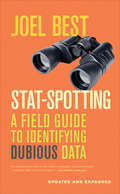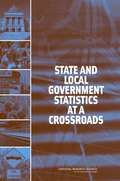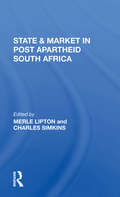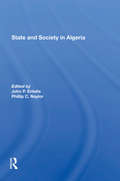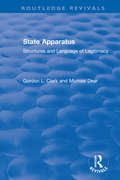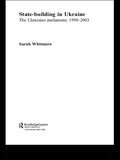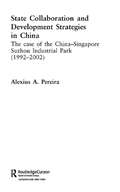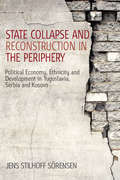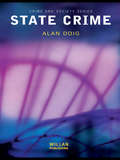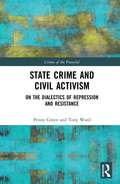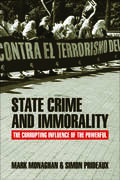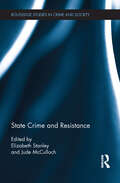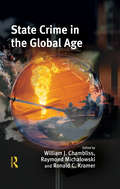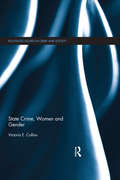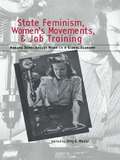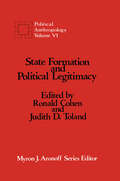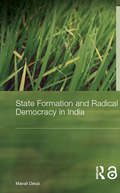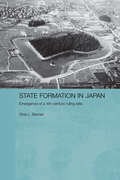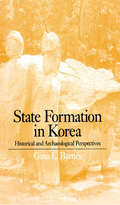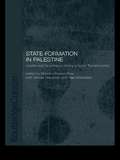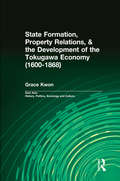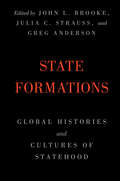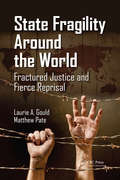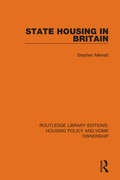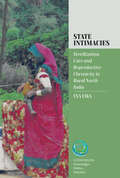- Table View
- List View
Stat-Spotting
by Joel BestDoes a young person commit suicide every thirteen minutes in the United States? Are four million women really battered to death by their husbands or boyfriends each year? Is methamphetamine our number one drug problem today? Alarming statistics bombard our daily lives, appearing in the news, on the Web, seemingly everywhere. But all too often, even the most respected publications present numbers that are miscalculated, misinterpreted, hyped, or simply misleading. This new edition contains revised benchmark statistics, updated resources, and a new section on the rhetorical uses of statistics, complete with new problems to be spotted and new examples illustrating those problems. Joel Best's best seller exposes questionable uses of statistics and guides the reader toward becoming a more critical, savvy consumer of news, information, and data. Entertaining, informative, and concise, Stat-Spotting takes a commonsense approach to understanding data and doesn't require advanced math or statistics.
State And Local Government Statistics At A Crossroads
by National Research Council of the National AcademiesSince the early days of the nation, the federal government has collected information on the revenues, expenditures, and other features of state and local jurisdictions and their operations. Today, these data are collected primarily by the Governments Division of the U.S. Census Bureau, which has conducted a census of governments every 5 years since 1957. The division also manages a program of related annual and quarterly surveys, as well as a comprehensive directory of state and local governments. All of this work is now taking place in an environment of constrained resources, and there have been cutbacks in the availability and dissemination of the data. In this context, State and Local Government Statistics at a Crossroads documents the uses of the state and local data and assesses the quality of the data for those uses. This book provides in-depth consideration of the efficiency of the surveys; the user base; and the timeliness, relevance, and quality of the data series. It also provides valuable background information and analysis and offers suggestions for program improvements. This information will be valuable to policy makers, state and local government workers, government contractors, budget analysts, economists, demographers, and others who rely on these data on government at the state and local levels and have a stake in ensuring that limited resources do not compromise the quality of the data on which they rely.
State And Market In Post-apartheid South Africa
by Merle Lipton Charles SimkinsThis book argues that South Africa experienced extensive periods of trade liberalisation in the 1970s and 1980s. It discusses the libertarian analysis of state failure, particularly the libertarian argument that market failures are less serious and less extensive than was once thought.
State And Society In Algeria
by John P Entelis Phillip C NaylorOn 11 January 1992 senior military officers forced President Chadli Benjedid to resign; canceled the second round of legislative elections and annulled the results of the first round, which saw the opposition Islamic Salvation Front (FIS) achieve a major electoral victory; and imposed a year-long state of siege. Constitutional government was replaced by an army-dominated so-called Higher State Council responsive to no one but itself. In the weeks and months that followed further draconian measures were undertaken intended to subvert the incipient democratic process that Algeria had been experiencing in the several years following the deadly riots of October 1988. As part of the army's effort to regain control of state and society, it reined in the free-wheeling press, abolished the country's most popular political party (FIS), dissolved the National Assembly, and reimposed on civil society the apparatus of the omnipresent state security system (mukhabarat).
State Apparatus: Structures and Language of Legitimacy (Routledge Revivals)
by Gordon L. Clark Michael DearOriginally published in 1984, State Apparatus contributes to the debate on the theory of the state through posing questions regarding the state’s form, function, and apparatus. The book begins by setting out the theoretical and methodological problems and reviewing the various Conservative, Liberal and Marxist theories in light of these. It discusses state activity, using specific case studies to clearly illustrate key points, such as the development of welfare systems in North America and Western Europe. It also explores the use of language under the state, the role of the legal apparatus within a capitalist system, and the "local state". The book concludes with a discussion of democracy and the crisis of legitimacy, and the issue of justice and the state. State Apparatus is a detailed and comprehensive text, ideal for those with an interest in the history, theory, form, and function of the state.
State Building in Ukraine: The Ukrainian parliament, 1990-2003 (BASEES/Routledge Series on Russian and East European Studies)
by Sarah WhitmoreThis book examines the development of the Ukrainian parliament - the Verkhovna Rada - from before Ukraine's independence in 1991 to the present. It shows how the parliament transformed itself from a provincial republican Soviet to the national legislature of a sovereign state and from a nominal, symbolic body to a genuine legislative and representative institution. It discusses the key role of parliament in the wider state-building process and examines the evolution of political factions and the committee system in the parliament.
State Collaboration and Development Strategies in China (Routledge Studies in the Growth Economies of Asia)
by Alexius PereiraThis book looks at Singapore and China to examine governmental collaboration on a foreign direct investment oriented strategy. Focusing on the unique collaborative venture, the Suzhou Industrial Park project, the author explores the economic, political and social relationships between Singapore and China throughout the course of the scheme as well as discussing why certain strategies were adopted, how they were implemented and their outcomes.
State Collapse and Reconstruction in the Periphery: Political Economy, Ethnicity and Development in Yugoslavia, Serbia and Kosovo
by Jens SörensenIn the 1990s, Yugoslavia, which had once been a role model for development, became a symbol for state collapse, external intervention and post-war reconstruction. Today the region has two international protectorates, contested states and borders, severe ethnic polarization and minority concerns. In this first in-depth critical analysis of international administration, aid and reconstruction policies in Kosovo, Jens Stilhoff Sörensen argues that the region must be analyzed as a whole, and that the process of state collapse and recent changes in aid policy must be interpreted in connection to the wider transformation of the global political economy and world order. He examines the shifting inter- and intracommunity relations, the emergence of a "political economy" of conflict, and of informal clientelist arrangements in Serbia and Kosovo and provides a framework for interpreting the collapse of the Yugoslav state, the emergence of ethnic conflict and shadow economies, and the character of western aid and intervention. Western governments and agencies have built policies on conceptions and assumptions for which there is no genuine historical or contemporary economic, social or political basis in the region. As the author persuasively argues, this discrepancy has exacerbated and cemented problems in the region and provided further complications that are likely to remain for years to come.
State Crime (Crime and Society Series)
by Alan DoigThis book provides an introduction to state crime, with a particular focus on the UK. The use of crime by the UK to achieve its policy and political objectives is an underdeveloped aspect of academic study of individual and institutional criminality, the exercise of political power, public policy-making and political development. The book provides an overview of definitional issues before exploring possible examples of state crime in the UK and then considering why state crime occurs and how it is investigated and adjudicated. State Crime is split into six sections in order to address a number of key questions: what is state crime according to the literature? What is a crime? What is the state? What are the drivers for the State to commit a crime? What are the roles of the various institutions of the State in being involved in state crime and what, in terms of monitoring or investigating state crime or unethical conduct, are the roles of those institutions, from the police through to Parliament, responsible for holding governments and state institutions to account? Unusually for books on state crime, this book looks at a specific country as the context within which to explore these issues. Further, it not only looks at crime but also the structure of the modern state and thus provides a balanced and rigorous perspective with which to study the concept of state crime. Overall, this book seeks to provide an introduction to state crime for contemporary states which will facilitate the study of such issues as part of mainstream academic study across a number of disciplines.
State Crime and Civil Activism: On the Dialectics of Repression and Resistance (Crimes of the Powerful)
by Tony Ward Penny GreenState Crime and Civil Activism explores the work of non-government organisations (NGOs) challenging state violence and corruption in six countries – Colombia, Tunisia, Kenya, Turkey, Myanmar and Papua New Guinea. It discusses the motives and methods of activists, and how they document and criticise wrongdoing by governments. It documents the dialectical process by which repression stimulates and shapes the forces of resistance against it. Drawing on over 350 interviews with activists, this book discusses their motives; the tactics they use to withstand and challenge repression; and the legal and other norms they draw upon to challenge the state, including various forms of law and religious teaching. It analyses the relation between political activism and charitable work, and the often ambivalent views of civil society organisations towards violence. It highlights struggles over land as one of the key areas of state and corporate crime and civil resistance. The interviews illustrate and enrich the theoretical premise that civil society plays a vital part in defining, documenting and denouncing state crime. They show the diverse and vibrant forms that civil society takes in a widely varied group of countries. This book will be of much interest to undergraduate and postgraduate social science students studying criminology, international relations, political science, anthropology and development studies. It will also be of interest to human rights defenders, NGOs and civil society.
State Crime and Immorality: The Corrupting Influence of the Powerful
by Simon Prideaux Mark MonaghanThis is the first book to examine the activities of UK and international ‘role models’ through the lens of state crime and social policy. Written by experts in the field of sociology and social policy, it defines the ideal state as a single, functioning whole that ensures uniformity in the name of legitimacy. It then details the ways that states do not constitute the ideal in terms of the dangers associated with the maintenance of legitimacy and state power. Anti-democratic measures, such as the invasions of other nation states, the idea that the media can both reinforce and influence the state and the problems of over-zealous policing of a state’s own populace, are covered. Using the topical example of Rupert Murdoch and the activities of his media organisation to show how powerful individuals and corporations can and do exert political influence, the book provides a comprehensive discussion of state immorality and deviance generally and state crime in particular. It will appeal to range of academics and practitioners in broader disciplines such as criminology, sociology, politics and political science.
State Crime and Resistance (Routledge Studies in Crime and Society)
by Elizabeth Stanley Jude McCullochWithin criminology ‘the state’ is often ignored as an active participant, or represented as a neutral force. While state crime studies have proliferated, criminologists have not paid attention to the history and impact of resistance to state crime. This book recognises that crimes of the state are far more serious and harmful than crimes committed by individuals, and considers how such crimes may be contested, prevented, challenged or stopped. Gathering together key scholars from the UK, USA, Asia, Australia and New Zealand, this book offers a deepened understanding of state crime through the practical and analytical lens of resistance. This book focuses on crimes ranging from gross violations of human rights (such as genocide, war crimes, mass killings, summary executions, torture, harsh detention and rape during war), to entrenched discrimination, unjust social policies, border controls, corruption, fraud, resource plunder and the failure to provide the regulatory environment and principled leadership necessary to deal with global warming. As the first to focus on state crime and resistance, this collection inspires new questions as it maps the contours of previously unexplored territory. It is aimed at students and academics researching state crimes, resistance, human rights and social movements. It is also essential reading for all those interested in joining the struggles to champion ways of living that value humanity and justice over power.
State Crime in the Global Age
by William J. Chambliss Raymond Michalowski Ronald C. KramerState Crime in the Global Age brings together original writings from leading scholars in the field to explore the many ways that the use and abuse of state power results in grave social harms that outweigh, by far, the consequences of ordinary street crime. The topics covered include the crimes of empire, illegal war, the bombing of civilians, state sanctioned torture, state sacrifice of human lives, and judicial wrongdoing. The book breaks new ground through its examination of the ways globalization has intensified potentials for state crime, as well as bringing novel theoretical understandings of the state to the study of state crime, and exploring strategies for confronting state crime. This book, while containing much that is of interest to scholars of state crime, is designed to be accessible to students and others who are concerned with the ways individuals, social groups, and whole nations are victimized by the misuse of state power.
State Crime, Women and Gender (Routledge Studies in Crime and Society)
by Victoria E. CollinsThe United Nations has called violence against women "the most pervasive, yet least recognized human rights abuse in the world" and there is a long-established history of the systematic victimization of women by the state during times of peace and conflict. This book contributes to the established literature on women, gender and crime and the growing research on state crime and extends the discussion of violence against women to include the role and extent of crime and violence perpetrated by the state. State Crime, Women and Gender examines state-perpetrated violence against women in all its various forms. Drawing on case studies from around the world, patterns of state-perpetrated violence are examined as it relates to women’s victimization, their role as perpetrators, resistors of state violence, as well as their engagement as professionals in the international criminal justice system. From the direct involvement of Condaleeza Rice in the United States-led war on terror, to the women of Egypt’s Arab Spring Uprising, to Afghani poetry as a means to resist state-sanctioned patriarchal control, case examples are used to highlight the pervasive and enduring problem of state-perpetrated violence against women. The exploration of topics that have not previously been addressed in the criminological literature, such as women as perpetrators of state violence and their role as willing consumers who reinforce and replicate the existing state-sanctioned patriarchal status quo, makes State Crime, Women and Gender a must-read for students and scholars engaged in the study of state crime, victimology and feminist criminology.
State Feminism, Women's Movements, and Job Training: Making Democracies Work in the Global Economy (Women in Politics in Democratic States)
by Amy G. MazurDrawing from the work of internationally renowned scholars from the Research Network on Gender, Politics and the State (RNGS), this study offers in-depth analysis of the relationship between state feminism, women's movements and public policy and places them within a comparative theoretical framework. Spain, France, Italy, Germany, Finland, Austria, Belgium, Canada, and the U.S. are all discussed individually.
State Formation and Political Legitimacy
by Ronald Cohen Myron J. Aronoff Judith D. TolandThe evolution of the state from earlier forms of political organization is associated with revolutionary changes in the structure of inequality. These magnify distinctions in rank and power that outweigh anything previously known in so-called primitive societies. This volume explains how and why people came to accept and even identify themselves with this new form of authority. The introduction provides a new theory of legitimacy by synthesizing and uniting earlier theories from psychological, cultural-materialist, rational choice, and Marxist approaches. The case studies which follow present a wide range of materials on cultures in both Western and non-Western settings, and across a number of different historical periods. Included are examples from Africa, Asia, Europe, and the New World. Older states such as Ur, Inca, and medieval France are examined along with more contemporary states including Indonesia, Tanzania, and the revolutionary beginnings of the United States.Using a variety of approaches the contributors show in each instance how the state obtained and used its power, then attempted to have its power accepted as the natural order under the protection of supra-naturally ordained authority. No matter how tyrannical or benign, the cases show that state power must be justified by faith and experience that demonstrates its value to the participants. Through such analysis, the book demonstrates that states must be capable of enforcing their rule, but that they cannot deceive populations into accepting state domination. Indeed, the book suggests that social evolution moves toward less coercive rule and increased democratization. Ronald Cohen is a political anthropologist who has taught at the Universities of Toronto, McGill, Northwestern, and Ahmadu Bello, and is on the faculty of the University of Florida. He has carried out field research in Africa, the Arctic and Washington. His major works include The Kanuri of Borno, Dominance and Defiance, Origins of the State, and a book in preparation on food policy and agricultural transformation in Africa.Judith D. Toland is a lecturer at University College, Northwestern University, and the College of Arts and Sciences, Loyola University of Chicago. She is the director of her own corporate and non-profit consulting firm. She has done fieldwork in Ayacucho, Peru and has written widely on the Inca State.
State Formation and Radical Democracy in India (Routledge Studies in Asia's Transformations)
by Manali DesaiState Formation and Radical Democracy in India analyzes one of the most important cases of developmental change in the twentieth century, namely, Kerala in southern India and begs the question of whether insurgency among the marginalized poor can use formal representative democracy to create better life chances. Going back to pre-independence, colonial India, Manali Desai takes a long historical view of Kerala and compares it with the state of West Bengal, which like Kerala has been ruled by leftists but has not had the same degree of success in raising equal access to welfare, literacy, and basic subsistence. This comparison brings the role of left party formation and its mode of insertion in civil society to the fore, raising the question of what kinds of parties can effect the most substantive anti-poverty reforms within a vibrant democracy. This book offers a new, historically based explanation for Kerala’s post-independence political and economic direction.
State Formation in Japan: Emergence of a 4th-Century Ruling Elite (Durham East Asia Series)
by Gina BarnesThis volume brings together for the first time a significant body of Professor Barnes' scholarly writing on Japanese early state formation, brought together so that successive topics form a coherent overview of the problems and solutions of ancient Japan. The writings are, in some cases, the only studies of these topics available in English and they differ from the majority of other articles on the subject in being anthropological rather than cultural or historical in nature.
State Formation in Korea: Emerging Elites (Durham East Asia Series)
by Gina BarnesThis volume brings together for the first time a significant body of Professor Barnes' scholarly writing on early Korean state formation, integrated so that successive topics form a coherent overview of the problems and solutions in peninsular state formation.
State Formation in Palestine: Viability and Governance during a Social Transformation (Routledge Political Economy of the Middle East and North Africa)
by Mushtaq Husain Khan George Giacaman Inge AmundsenThis book examines key questions and challenges the widely prevalent view that the Palestinian Authority collapsed because of its internal governance failures, its lack of commitment to democracy, and corruption. It argues that the analytical framework of 'good governance' is not appropriate for assessing state performance in developing countries, and that it is especially inappropriate in conflict and post-conflict situations. Instead, an alternative framework is proposed for assessing state performance in a context of economic and social transformation. This is then applied in detail to different aspects of state formation in Palestine, showing that the institutional architecture set up by the Oslo agreements was responsible for many of the serious failures.
State Formation, Property Relations, & the Development of the Tokugawa Economy (East Asia: History, Politics, Sociology and Culture)
by Grace KwonBefore the late 1960s, Japan historians characterized the Early Modern Japanese economy in waht are typical feudal terms. Considered backward and stagnant, it was argued that the economy eventually collapsed under the weight of its own internal limitations. This narrative has given way in the past two decades to a new interpretation in which Japan's pre-industrial economy is protrayed as one of substantive growth and qualitative change, the setting stage for modern development during the Meiji era.
State Formations: Global Histories and Cultures of Statehood
by Greg Anderson John L. Brooke Julia C. StraussFeaturing a sweeping array of essays from scholars of state formation and development, this book presents an overview of approaches to studying the history of the state. Focusing on the question of state formation, this volume takes a particular look at the beginnings, structures, and constant reforming of state power. Not only do the contributors draw upon both modernist and postmodernist theoretical perspectives, they also address the topic from a global standpoint, examining states from all areas of the world. In their diverse and thorough exploration of state building, the authors cross the theoretical, geographic, and chronological boundaries that traditionally shape this field in order to rethink the customary macro and micro approaches to the study of state building and make the case for global histories of both pre-modern and modern state formations.
State Fragility Around the World: Fractured Justice and Fierce Reprisal
by Laurie A. Gould Matthew PateFailed and fragile states often govern through the criminalization of otherwise inconsequential or tolerated acts. These weak states also frequently use kidnapping, murder, and other violent or oppressive tactics to maintain order and stay in power. State Fragility Around the World: Fractured Justice and Fierce Reprisal analyzes the path to state f
State Housing in Britain
by Stephen MerrettOriginally published in 1979, this book was the first to provide a comprehensive political-economic analysis of the historical origins and 20th Century experience of state housing in the UK. The first part describes the growth of municipal housebuilding in the context of slum clearance before 1914 and the cycle of boom and slump between the wars. Part 2 covers 1945- 1980 with chapters on : site acquisition and residential densities; the housebuilding industry and its standards; the balance between rehabilitation and redevelopment and the rise and fall of the high-rise flat. Sources and costs of capital finance and the management of the stock of council dwellings is also discussed. The final part reviews the development of state housing policy since the War, within a broad political and macro-economic context.
State Intimacies: Sterilization, Care and Reproductive Chronicity in Rural North India (Lifeworlds: Knowledges, Politics, Histories #4)
by Eva FiksThe public healthcare system in rural India is chronically under-resourced. It embodies and often perpetuates the wider politics of the Indian state towards its rural communities with provisions of care that are deeply entangled with violence and disgust. For rural women, such care deepens reproductive chronicity while providing temporary relief. Grounded in women’s everyday realities and experiences in sterilization camps and other healthcare settings in rural Rajasthan, State Intimacies examines the mundane workings, ambiguities and fragilities of care in post-colonial rural North India.
